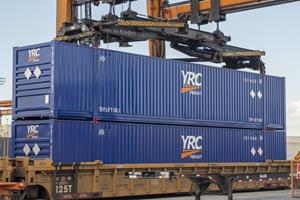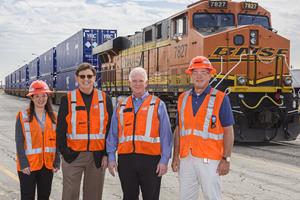Today YRC Freight announced that by the end of this year YRC and BNSF Railway Company (BNSF) will have onboarded more than 600 branded intermodal containers. These new containers are part of the YRC commitment to acquire 1,000 branded intermodal containers by the end of 2020. Most of the containers will travel between Chicago and Southern California on BNSF’s network.
At YRC Freight, our intermodal commerce with BNSF is evolving. We are reinforcing our commitment to YRC Freight-branded containerized units for the present and the future. As intermodal usage continues to shift to containerized transport, YRC Freight will already be there,” confirms YRC Worldwide Chief Operating Officer and YRC Freight President T.J. O’Connor.
 Intermodal operations between truck and rail are a valuable emissions reduction strategy in the central and western United States to move trailers/containers over long distances. YRC Freight deploys a number of strategies to reduce its carbon footprint including its work with BNSF, use of longer combination vehicles, onboarding of new tractors with advanced emission reduction technologies and integration of industry-leading routing and load optimization software. Recently, YRC Freight renewed its annual certification with the award-winning EPA SmartWay voluntary emissions program.
Intermodal operations between truck and rail are a valuable emissions reduction strategy in the central and western United States to move trailers/containers over long distances. YRC Freight deploys a number of strategies to reduce its carbon footprint including its work with BNSF, use of longer combination vehicles, onboarding of new tractors with advanced emission reduction technologies and integration of industry-leading routing and load optimization software. Recently, YRC Freight renewed its annual certification with the award-winning EPA SmartWay voluntary emissions program.
“Operationally, all intermodal companies are looking at how to improve efficiency,” said YRC Freight Senior Vice President, Operations, Maynard Skarka. “Currently, we use smaller trailers called ‘pups’ to transport freight for our customers. This new shift to our branded containerized units will allow us to stay aligned with intermodal companies as we both look for operational efficiencies.”
BNSF remains focused on working with its customers to develop the best supply chain solutions for the movement of containers and trailers across its rail network. Its collaboration with YRC is great example of how it is doing that.
“At BNSF we are always looking at how we can create more efficiencies and greater capacity on our network, particularly in markets like the Inland Empire where containerization will help us leverage capacity to grow with increasing demand over time,” said BNSF Vice President, Domestic Intermodal, Todd Carter. “We will continue to work with our customers to transport both containers and trailers and will make adjustments that make sense to our overall logistics strategy with an eye toward meeting our customers’ expectations and fostering our mutual ability to grow.”











